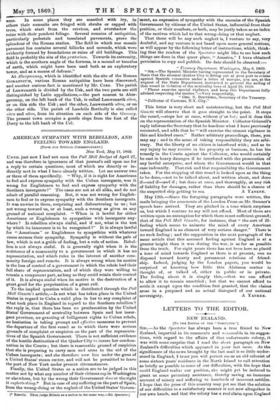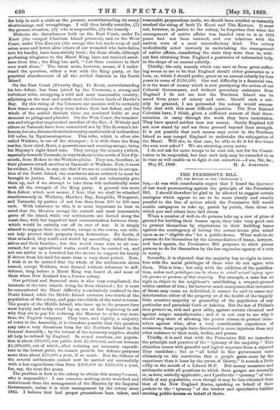LETTERS TO THE EDITOR.
NEW ZEALAND.
[TO THE EDITOR OF THE " SPECTATOR.1 SIR,—As the Spectator has always been a true friend to New Zealand, impartial in its comments and reasonable in its suggestions, with regard to the affairs of that unfortunate colony, it was with some surprise that I read the short paragraph on New Zealand's difficulties which appeared in your last issue. As the significance of the news brought by the last mail is so little understood in England, I trust you will permit me as an old colonist of some sixteen years' residence in the North Island to call attention as briefly as possible to some of our difficulties, with the hope that could England realize our position, she might yet be induced to grant us some pecuniary assistance, thereby saving an immense amount of misery and suffering to hundreds of innocent settlers. I hope that the press of this country may yet see that the solution of our difficulties in a satisfactory manner is not now altogether in our own hands, and that the colony has a real claim upon England
for help in such a crisis as the present, notwithstanding its many shortcomings and wrongdoings. I will then briefly consider, (1) the present situation, (2) who is responsible, (3) the remedy. Hitherto the disturbances both on the East Coast, under Te Kooti (the escaped Chatham Island prisoner), and on the West Coast, under Tito Kowaru (the savage who has made soup of and eaten some and burnt alive others of our wounded who have fallen into his hands), have been strictly local ; for these chiefs, although professing allegiance to the Maori King, have not received assistance from him ; the King has said, " Let them continue in their own work alone." The latest news, however, means, if I understand the question, either a war with the King party, or the practical abandonment of all the settled districts in the North Island.
On the East Coast (Poverty Bay), Te Kooti, notwithstanding his late defeat, has been joined by the Ureweras, a strong and turbulent tribe, occupying a wild and most inaccessible country, adjoining on the west and north-west the Crown lands of Hawke's Bay. By this rising of the Urewern our enemies will be certainly four times as strong as they were before their last defeat, and the whole of the settled districts there are rendered liable at any moment to pillage and plunder. On the West Coast, the treacherous and altogether unprovoked murders of the Rev. J. Whitely and others at Taranaki have been committed not by Tito Kowaru's followers, but at a distance from their country northwards of notless than 100 miles, by Ngatimaniapotoes. This tribe, which is often also called Waikato, is one of the strongest ; it is with them the King resides, their chief, Rewi, a quarrelsome and cunning savage, being his Majesty's right-hand man. They occupy the country (which, especially towards Taranaki, is very broken) to the north of New Plymouth, from Mokau to the Waikato plains. They can, therefore, at their pleasure attack us either at Taranaki or Waikato. Now, it must be evident, I think, to any one that if we are to continue in occupation of the North Island, the murderer's above referred to must be brought to justice. Rewi, it is certain, will not voluntarily give them up, and if we attempt to take them will undoubtedly resist with all the strength of the King party. A general war must then follow, which now means, I fear, that we shall be attacked simultaneously in Waikato, Hawke's Bay, Rangitiki, Wanganui, and Taranaki, by parties of not less than from 200 to 400 men each. With reference to this, it is moat important to bear in mind that the Maories occupy the central and most inaccessible parts of the island, while our settlements are dotted along the coast-line, with but imperfect land communication between them, which would be entirely cut off in case of war. It is simply absurd to suppose that the settlers, except in the towns, can without help protect their property from destruction. No doubt, if thus attacked, they could and would by assembling defend themselves and their families ; but this would cause ruin to all concerned, for no agricultural works could then be carried on, and not one settler in a hundred has the means to support his family if driven from his land for more than a very short period. Now, I wish it to be noticed that the whole of the settlements above named, except Waikato, were formed without reference to selfdefence, long before a Maori King was heard of, and most of them when New Zealand was a Crown colony.
Our political and financial state is also very complicated, the interests of the two islands being far from identical ; for it must be remembered the Maori difficulty is exclusively confined to the North Island, while the Middle Island contains two-thirds of the population of the colony, and pays two-thirds of the total revenue. The people of the Middle Island, who have up to the present time most loyally and nobly stood by us, are at last beginning to ask why they are to pay for reducing the Maories to order any more than the English taxpayer. They have, and rightly, a majority of votes in the Assembly, it is therefore possible that this question may take a very disastrous form for the Northern Island in the General Assembly ; by the refusal of the necessary supplies, should all help be refused by England. In round numbers, our population is about 220,000, our public debt £7,000,000, and our revenue £1,000,000, out of which, after reducing our necessary expenditure to the lowest point, we cannot provide for defence purposes more than about £70,000 a year, if so much. But the defence of the several settlements cannot now be carried out successfully with a less expenditure than from £200,000 to £250,000 a year, for, say, the next five years.
The problem is how is the colony to obtain this money ?—next, who is responsible? I can conceive nothing more wretched and unfortunate than the management of the Maories by the Imperial Government, unless it is their management by the colony since 1865. I believe that had proper precautions been taken, and
reasonable preparations made, we should have avoided or instantly crushed the rising of both Te Kooti and Tice Kowaru. It must not, however, in justice to the colony, be forgotten that when the management of native affairs was handed over to it in 1864 peace had not been restored, and our relations with the natives were of a most unsatisfactory kind. The colony undoubtedly acted unwisely in undertaking the management of native affairs, considering the state they were then in, without first obtaining from England a guarantee of substantial help, in the shape of an annual subsidy.
Thirdly, the only remedy which can save us from great suffering seems to me to be that England should either guarantee us a loan, or, which I should prefer, grant us an annual subsidy for four years to come of £150,000. Our real difficulty is a financial one, it is the want of money which is now paralyzing the action of our Colonial Government, and without pecuniary assistance from England I do not see how the Northern Island can be saved from years of misery and ruin. Should such a subsidy be granted, I am persuaded the colony would successfully deal with this most difficult question. The New Zealand Colonists have, I think, given a sufficient earnest of their determination to carry through the work they have undertaken. They have spared neither men nor money. Surely England will not now stand by and see them pressed beyond their strength. It is yet possible that such scenes may occur in the Northern Island as may compel England to undertake the subjugation of the Maori. Will she, in that case, be able to do it for five times the sum now asked ? We are straining every nerve.
I do not ask for more troops to be sent out, nor for the Constitution to be suspended, but that such help may be extended to us in time as will enable us to fight it out ourselves.—I am, Sir, &c., May 27, 1868. H. A. ATED780N.































 Previous page
Previous page